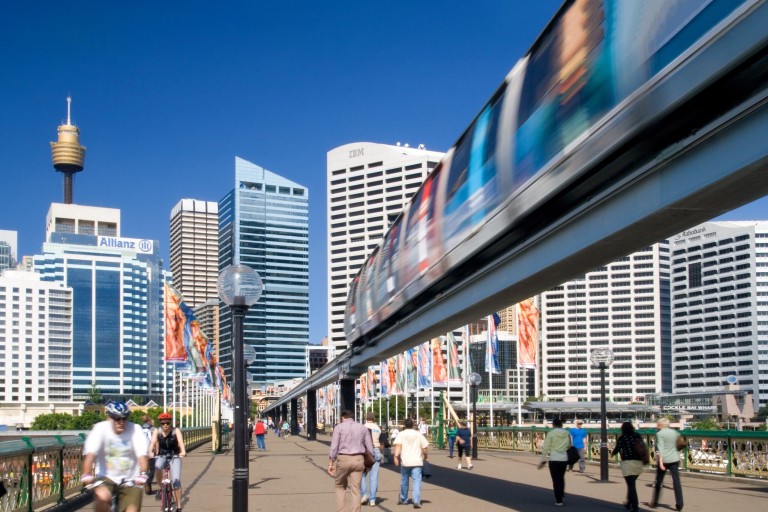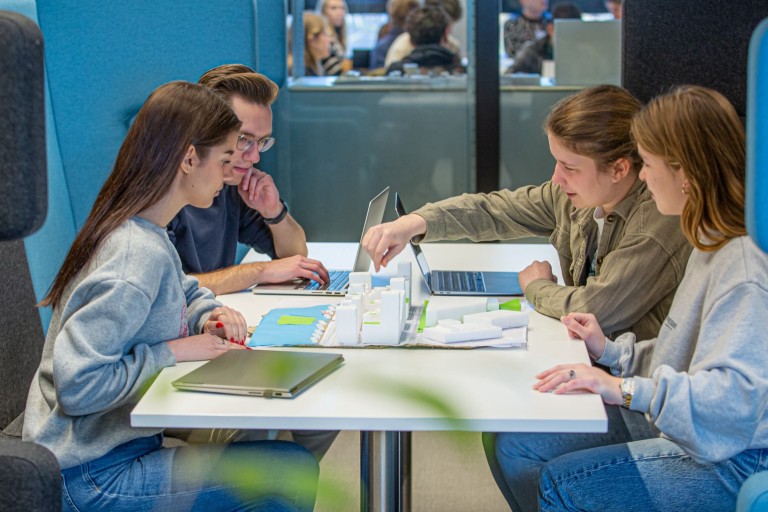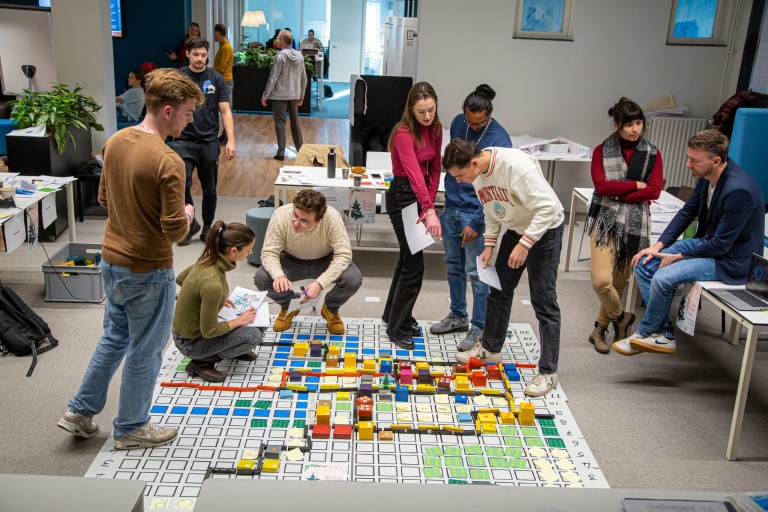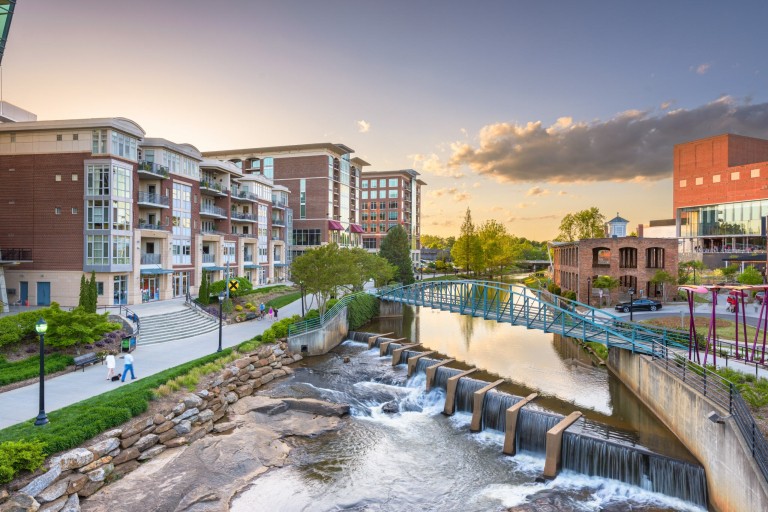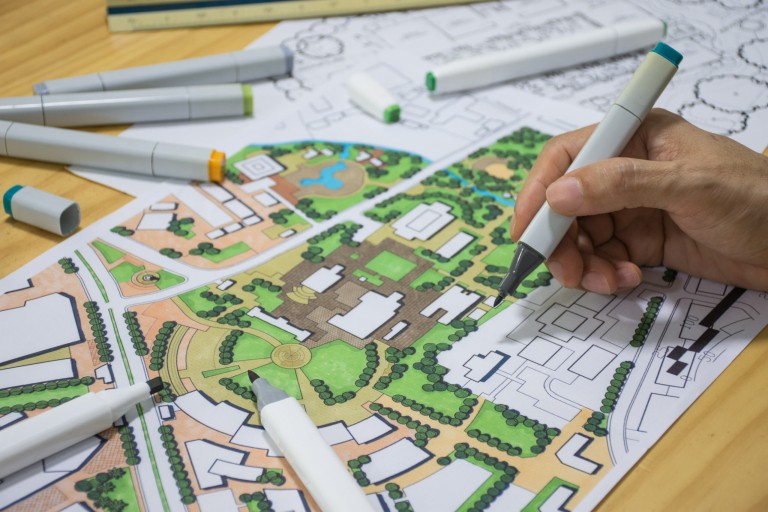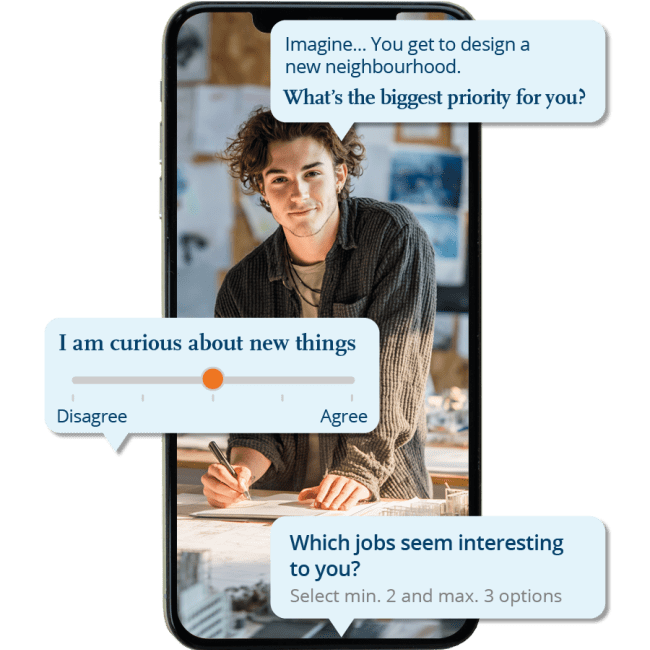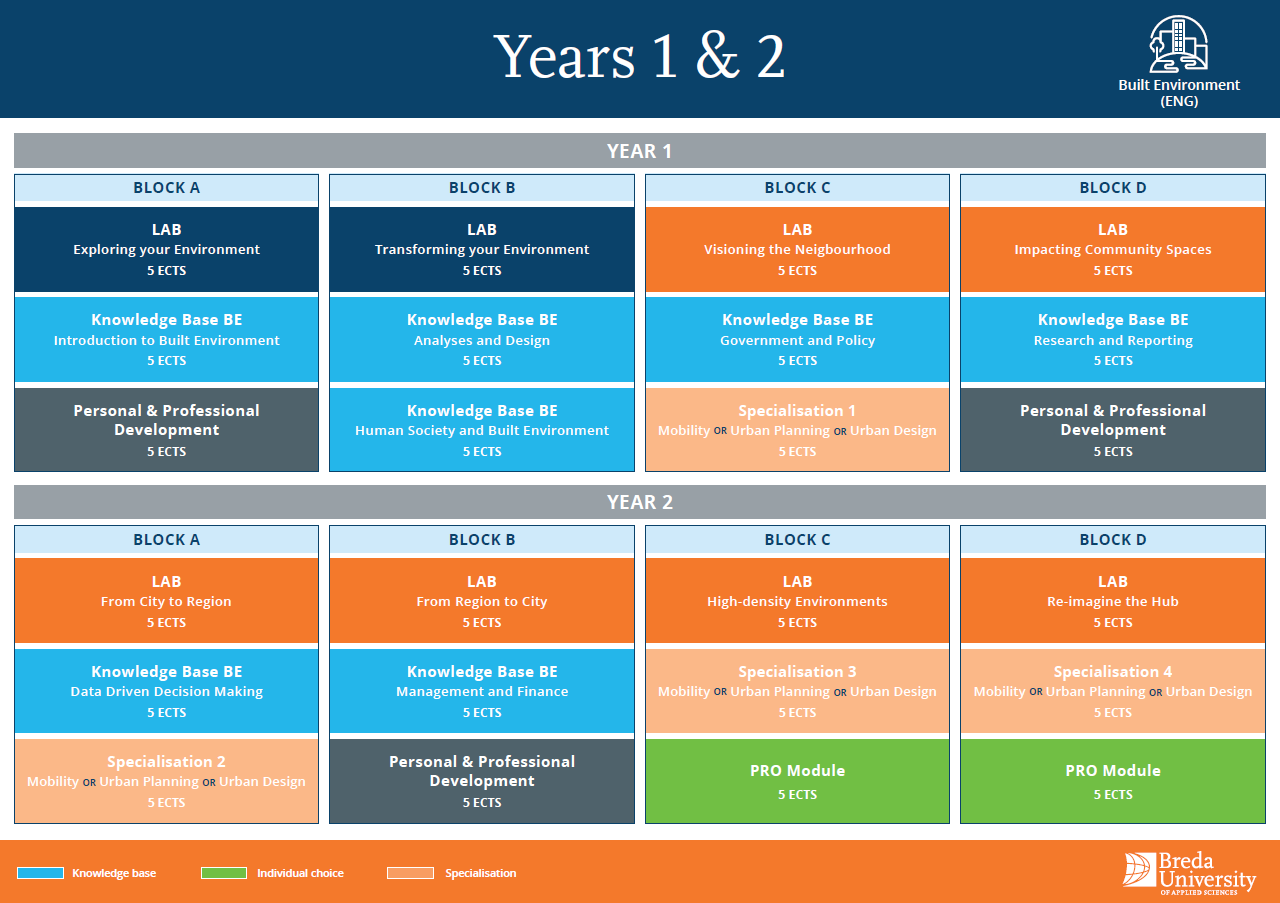Come and meet us
Walking around on campus is the best way to truly experience BUas. Sign up for one of the upcoming events or activities.
Do you want to shape the sustainable cities of the future?
Discover if Built Environment is right for you with our quiz.
- It only takes 3 minutes
- Your result in seconds
- Learn more about Built Environment
Study overview
In the first year, you will be introduced to all aspects of the Built Environment discipline and work on a thorough (knowledge) base before you will further specialise. Year 1 is divided into four terms (A through D). During a term, you will attend theoretical modules, but you will also work together with other students on a spatial project or assignment.
- Term A and B (semester 1)
You will be given an introduction to Built Environment, in which all important components from the subject area will be addressed with inspiring practical examples. You will learn theoretical knowledge about people and society, how cities operate, and how you can study, analyse and (re)design them.
After term B you will make a choice from one of the three specialisations:
- Mobility
- Spatial Planning
- Urban Design
- Term C and D (semester 2)
In terms C and D a lot of attention is paid to how you – from the perspective of your own specialism - play a part in projects together with other fellow students.
During the LAB projects in year 1 you will have several excursions, during which you will visit industry organisations as well as cities. They will give you a more integral picture of the field of expertise and you will see how Built Environment is applied in everyday practice – an eye-opener!
Are you curious about the structure of the study programme and the courses that a Built Environment student attends? Have a look at the student handbook.
Year 2
From year 2 onwards you will broaden or deepen your knowledge in addition to your specialism and role within projects, by choosing your own courses. You can choose from various courses, such as Rural Areas, Energy Transition, Smart Mobility, VIS Beyond Blueprints, Participation in Practice, or Traffic and Transport Modelling.
Year 3
Year 3 starts with a six-month work placement at a government institution, consultancy firm or another organisation. Or you choose a research project in our own Research & Business Innovation (RBI) department. In the latter half of the year you will take part in a big project: The City of the Future, in which you will use all the knowledge acquired to date to create your own vision and plan for the future’s (urban) living environment
Year 4
At the beginning of year 4, you will attend a minor; a deepening minor in which you will further specialise in the field of study, or you will take a look beyond the boundaries of your field of study: a broadening minor. You can also take a minor abroad. In the latter half of the year, you will do your graduation project and a graduation assignment for an organisation.
- Placement
In the first half of year 3, you will do an 18-week work placement. You carried out several business cases/practical cases within groups in the project education in year 1 and 2. Now you are going to do so on your own. This means you will carry out (an) assignment(s) independently or contribute to (a) project(s). You will do so at consultancy firms, design agencies, government institutions, and big companies such as Arcadis, BAM, Public Works and Water Management (Rijkswaterstaat), Dutch Railways (NS), ANWB, etc.
It is also possible to take an in-depth look at one of the research projects within our Research and Business Innovation (RBI) department for six months. You are going to search for a company that matches your interests, or which you would like to work for in the future. The department will assign a lecturer or supervising lecturer who will supervise your placement.
- Graduation project
In year 4 you will commence your graduation project as from February. You will conduct your own research commissioned by a company. Upon completion of the research, it can be used for the organisation. You will search for a graduation host company and graduation assignment independently. You will work on the site during the graduation project. You will be supervised individually by a BUas supervising lecturer and by a company supervisor.
Examples of topics are:
- Research into multiple use of space at railway stations
- Satisfaction survey among users of cycle routes
- Restructuring of business parks
- Design research into urban infill development locations
You will write a thesis about this assignment, which you will defend during your final exam.
You will have a chance to go abroad for your placement and graduation project, and, in doing so, develop in terms of content and personally in another culture. Something we would encourage very much.
- Exchange
Studying abroad is the perfect opportunity to push your boundaries. You build up an international network, learn a new language, and gain insight into intercultural differences. BUas works with universities all over the world, so as an exchange student you have plenty of options. For example:
- Hamk Hämeen University of applied sciences (Finland)
- Universidade de Sao Paulo (Brasil)
- University of Galway (Ireland)
- Bilgi University (Turkey)
- Middle East college (Oman)
- Minors
With a minor, you choose for yourself: do you want to specialise in your field or broaden your knowledge? You can take a minor at BUas, but you can also choose to do a minor at another Dutch university of applied sciences, or even abroad.
If you want to take an in-depth look at the Built Environment discipline, we offer several minors. An example is the minor International Urban Redevelopment. You will take a look at solutions for sustainable mobility and growth in cities all over the globe. BUas students and lecturers went to visit Calgary, where they made a plan for restructuring a high street. If you are curious about what they did there, please read on here.
- Pre-master
In your final year of study, you may choose to attend the academic pre-master's track in Strategic Business Management and Marketing (SBM). This pre-master will give you direct access to Master of Science programmes at top universities such as Maastricht, Rotterdam, Tilburg, Antwerp (B), and Warwick (UK). You can also move on to our university master's degree in Leisure and Tourism Studies. This way, you can earn a university master's degree in just five years – or even in four years, through the accelerated (three-year) track.
The educational programme of Built Environment is very diverse and hands-on. When doing this study programme you will learn about people and society, how cities operate, and how you can study, analyse and (re)design them. You will soon apply theoretical knowledge in learning communities, and in doing so, you cooperate a lot with fellow students, your lecturers and the industry.
You will work on joint and individual projects. You will attend workshops and guest lectures, but you will also visit businesses, for example. Each term contains a LAB (project) and several modules/business cases. In addition, you will constantly work on your personal and professional development under the guidance of your coach.
Coaching
During the first two years of your study programme you will attend the Personal & Professional Development (PPD) course. This involves a programme consisting of lectures and workshops about specific themes (e.g. time management, collaboration, giving presentations) which will support you in your personal and professional development. You will work on various types of assignments and reflect on your development and choices (e.g. with regard to a work placement in year 3). In the PPD track, you will receive personal guidance from your study coach, during which your study progress will also be discussed.
- A typical week
In year 1 the lectures you will attend are very diverse. You will be offered theory in lectures, and you can immediately apply it to assignments to be carried out in seminars. Also, experts from the Built Environment discipline come and tell you something about their work or a certain topic in guest lectures. What’s more, you will spend a lot of time on working on a project in groups with fellow students.
A study week may look as follows (Please note: this is just an example):
Monday
- 10.00-12.00: Lecture: Introduction to Built Environment
- 12.00-13.00: Lunch
- 13.00-15.00: Lecture on Personal & Professional Development
Tuesday
- 13.00-17.00: Introduction to your ‘Discover Your Environment’ LAB1 project
Wednesday
- 11.00-12.30: In the Personal & Professional Development seminar, you will start working on creating a study plan
- 12.30-13.00: Lunch
- 13.00-15.00: For the Introduction to Built Environment course, you will work on a current case study together with your fellow students during a seminar
Thursday
- 9.00-12.00: For the LAB project, you will visit the project location with your group and identify the strengths and weaknesses of the area
- 12.00-13.00: Lunch
- 13.00-16.00: Independent study in the library on campus
- 16.00-20.00: Drinks party organised by the BELO study society
Friday
- 9.00-14.00: You will work on campus to complete your assignments
Student well-being
BUas encourages and helps you to make the most of yourself, whatever your circumstances. Maybe you have a chronic illness, are a family carer, a competitive athlete, or juggle your studies with running your own business? Our study coaches, student counsellors and student psychologists are here to help. Do you need extra support or advice? Or extra facilities? Then take a look at the options here.
After the first semester in year 1, you will make a choice from one of the three specialisations:
1. Mobility
The world of mobility is in a state of flux, with innovations coming in rapid succession. Think of smart mobility, shared mobility, new vehicle technologies, the rise of cycling and walking, and the use of big data. In this specialisation, you will dive into these developments. Not only will you be introduced to these groundbreaking themes, but you will also have the opportunity to actively contribute to the future of mobility.
2. Spatial Planning
You will draw up plans and policies for spatial development projects and ensure that these are in line with the wishes of residents, the municipality, businesses and other stakeholders. For example, you might draw up an environmental plan for the transformation of an old industrial site in a city into an area with homes, offices and recreational facilities. In doing so, you take into account the latest societal and technological developments and research trends in living, working and recreation. Your plans are financially feasible and comply with the law. You supervise the entire process, from idea to implementation.
3. Urban Design
In this specialisation, you will learn to create urban designs for various areas, ranging from sustainable new neighbourhoods to redevelopment projects in urban areas. Examples include projects such as the transformation of a railway zone into a vibrant urban neighbourhood. You will also work on designs for entire regions and rural areas. In our design studios, you will bring your ideas to life through site plans, cross-sections and 3D models, developing practical and creative skills that are essential for contributing to the future of the spatial domain.
As a Built Environment student you will explore your field of study during excursions at home and abroad throughout your studies. In the first year, you will visit cities (e.g. Rotterdam, Eindhoven) and organisations (e.g. Rijkswaterstaat) in the Netherlands where you will learn about the different specialisations of Built Environment.
In the second year, you will also go on an excursion abroad, exploring differences and similarities between Built Environment in the Netherlands and in a European city. The cities of Copenhagen and Barcelona are recurring excursion destinations. Also during the projects you often do field research, so you can incorporate the findings and ideas into your plan.
- With an associate degree (BE) - 2 years
With an associate degree in Built Environment or Spatial Planning and the right specialisation area, you will qualify for admission into our bachelelor’s programme in Built Environment, both the English-taught and the Dutch-taught variants. The duration of our bachelor’s programme is 4 years, however, with an associate degree already in your pocket you can complete our bachelor’s programme faster.
After completing your associate degree, you will follow another 2 years of education (120 ECTS credits) at Breda University of Applied Sciences. After earning all your credits, you will have obtained your Bachelor of Science degree.
Want to know more?
Do you want to obtain more information about moving on to further study after your associate degree? If so, please contact the student counsellors of this programme, Minke Snels and Lizanne Hessels: [email protected].- After a related secondary vocational education (mbo) programme – 3 years
Did you complete one of these secondary vocational education (mbo level 4) programmes?
- Middenkaderfunctionaris bouw
- Middenkaderfunctionaris infra
- Middenkaderfunctionaris verkeer en stedenbouw/Urban Design
If so, you may qualify for the mbo-hbo transfer track. Based on one of these secondary vocational education programmes you can get exemptions for year 1 of the Built Environment programme (NL), upon successful completion of the track. As a result, you will be able to complete the degree programme in three years’ time.
What does the mbo-hbo transfer track mean?
When you are in the last year of your secondary vocational education programme, you can take part in the mbo-hbo transfer track. Over an 18-week period, on Wednesdays, you will take several training sessions and courses and carry out a project. If you receive a positive recommendation after having completed this track, you will be able to enter the second year of the Built Environment degree programme. The transfer track always starts around mid-February and lasts until mid-June. Please download the brochure (see below) for more information. And feel free to contact the student counsellor to discuss the possibilities, [email protected].Please note: Only students of the programme middenkaderfunctionaris verkeer en stedenbouw/Urban Design of Koning Willem I college in 's-Hertogenbosch will qualify for transfer into the second year of the Urban Design specialisation area.
Is it for you?
The transfer track is meant for you to find out whether education at a higher general secondary education (hbo) level suits you and whether you can handle education at this level. If you are going to follow this track, you will be enrolled as a course participant at Breda University of Applied Sciences. You do not yet pay any tuition fee, but you can make use of our student facilities. Just come and visit us on one of our open days, so you can get a taste of the atmosphere of studying at a higher general secondary education institute, and you will have the opportunity to talk about the transfer track with our student counsellor.How and until when can you apply?
To apply for the mbo-hbo transfer track, please go to Studielink. You can apply for this programme until 30 January.Want to know more?
Do you want to know more about this track? Please contact the student counsellors of this programme, Minke Snels and Lizanne Hessels: [email protected], telephone (076) 533 2600, or download the mbo-hbo transfer track brochure (in Dutch).- After pre-university education (vwo) – 3 years
If you are interested in a three-year track, you should study the course material of year 1 yourself, so you master the basics of Built Environment. To be able to complete this four-year programme in three years, you must have a range of abilities in addition to your pre-university education (vwo) diploma, for instance:
- Plan your studies well;
- Work and learn independently;
- Take responsibility for your studies;
- Know what you want;
- Enjoy working together with other people.
The track consists of three years, each year comprising 60 ECTS credits, adding up to 180 ECTS credits in total. You will start your first year in the regular second year, which will be your propaedeutic year. After that, you will attend the regular third and fourth years.
Guidance and transfer options
Participation in this three-year programme is challenging. You will start in year 2 and take all the courses that second-year students take. That is why you will receive extensive guidance from a study coach during the first year of the programme. During meetings, you will discuss your progress in your courses, your results and your experiences.In our experience, students with a pre-university education usually cope well with this. If you find that it is too difficult, you can transfer to the regular first year and complete the programme in four years.
How can you apply?
If you want to take part in this track, please follow the regular application procedure and indicate, in Studielink, your preference for the three-year track.Want to know more?
If you want to know more about this three-year track, please contact the student counsellors of this programme, Minke Snels and Lizanne Hessels: [email protected], telephone (076) 533 2600.- After a propaedeutic certificate (professional or academic) - 3 years
If you are in possession of a higher professional education (hbo) or academic (wo) degree or propaedeutic certificate, please contact the student counsellors of this programme, Minke Snels and Lizanne Hessels: [email protected], telephone (076) 533 2600.
At BUas, you develop your entrepreneurial skills in all programmes. You can also join BUas Startup Support (BUSS), where you attend networking meetings and receive guidance from a startup coach.
Would you like to graduate with your own company? You can do that at any academy, although a selection procedure may apply. Whether you are already generating revenue or just have an initial idea, BUas Startup Support will help you.
Read more about starting your own business.
- Year 1
-
In the first year, you will be introduced to all aspects of the Built Environment discipline and work on a thorough (knowledge) base before you will further specialise. Year 1 is divided into four terms (A through D). During a term, you will attend theoretical modules, but you will also work together with other students on a spatial project or assignment.
- Term A and B (semester 1)
You will be given an introduction to Built Environment, in which all important components from the subject area will be addressed with inspiring practical examples. You will learn theoretical knowledge about people and society, how cities operate, and how you can study, analyse and (re)design them.
After term B you will make a choice from one of the three specialisations:
- Mobility
- Spatial Planning
- Urban Design
- Term C and D (semester 2)
In terms C and D a lot of attention is paid to how you – from the perspective of your own specialism - play a part in projects together with other fellow students.
During the LAB projects in year 1 you will have several excursions, during which you will visit industry organisations as well as cities. They will give you a more integral picture of the field of expertise and you will see how Built Environment is applied in everyday practice – an eye-opener!
Are you curious about the structure of the study programme and the courses that a Built Environment student attends? Have a look at the student handbook.
- Years 2, 3 and 4
-
Year 2
From year 2 onwards you will broaden or deepen your knowledge in addition to your specialism and role within projects, by choosing your own courses. You can choose from various courses, such as Rural Areas, Energy Transition, Smart Mobility, VIS Beyond Blueprints, Participation in Practice, or Traffic and Transport Modelling.Year 3
Year 3 starts with a six-month work placement at a government institution, consultancy firm or another organisation. Or you choose a research project in our own Research & Business Innovation (RBI) department. In the latter half of the year you will take part in a big project: The City of the Future, in which you will use all the knowledge acquired to date to create your own vision and plan for the future’s (urban) living environmentYear 4
At the beginning of year 4, you will attend a minor; a deepening minor in which you will further specialise in the field of study, or you will take a look beyond the boundaries of your field of study: a broadening minor. You can also take a minor abroad. In the latter half of the year, you will do your graduation project and a graduation assignment for an organisation.- Placement
In the first half of year 3, you will do an 18-week work placement. You carried out several business cases/practical cases within groups in the project education in year 1 and 2. Now you are going to do so on your own. This means you will carry out (an) assignment(s) independently or contribute to (a) project(s). You will do so at consultancy firms, design agencies, government institutions, and big companies such as Arcadis, BAM, Public Works and Water Management (Rijkswaterstaat), Dutch Railways (NS), ANWB, etc.
It is also possible to take an in-depth look at one of the research projects within our Research and Business Innovation (RBI) department for six months. You are going to search for a company that matches your interests, or which you would like to work for in the future. The department will assign a lecturer or supervising lecturer who will supervise your placement.
- Graduation project
In year 4 you will commence your graduation project as from February. You will conduct your own research commissioned by a company. Upon completion of the research, it can be used for the organisation. You will search for a graduation host company and graduation assignment independently. You will work on the site during the graduation project. You will be supervised individually by a BUas supervising lecturer and by a company supervisor.
Examples of topics are:
- Research into multiple use of space at railway stations
- Satisfaction survey among users of cycle routes
- Restructuring of business parks
- Design research into urban infill development locations
You will write a thesis about this assignment, which you will defend during your final exam.
You will have a chance to go abroad for your placement and graduation project, and, in doing so, develop in terms of content and personally in another culture. Something we would encourage very much.
- Exchange
Studying abroad is the perfect opportunity to push your boundaries. You build up an international network, learn a new language, and gain insight into intercultural differences. BUas works with universities all over the world, so as an exchange student you have plenty of options. For example:
- Hamk Hämeen University of applied sciences (Finland)
- Universidade de Sao Paulo (Brasil)
- University of Galway (Ireland)
- Bilgi University (Turkey)
- Middle East college (Oman)
- Minors
With a minor, you choose for yourself: do you want to specialise in your field or broaden your knowledge? You can take a minor at BUas, but you can also choose to do a minor at another Dutch university of applied sciences, or even abroad.
If you want to take an in-depth look at the Built Environment discipline, we offer several minors. An example is the minor International Urban Redevelopment. You will take a look at solutions for sustainable mobility and growth in cities all over the globe. BUas students and lecturers went to visit Calgary, where they made a plan for restructuring a high street. If you are curious about what they did there, please read on here.
- Pre-master
In your final year of study, you may choose to attend the academic pre-master's track in [nhtv:strSBMM] (SBM). This pre-master will give you direct access to Master of Science programmes at top universities such as Maastricht, Rotterdam, Tilburg, Antwerp (B), and Warwick (UK). You can also move on to our university master's degree in Leisure and Tourism Studies. This way, you can earn a university master's degree in just five years – or even in four years, through the accelerated (three-year) track.
- Teaching method
-
The educational programme of Built Environment is very diverse and hands-on. When doing this study programme you will learn about people and society, how cities operate, and how you can study, analyse and (re)design them. You will soon apply theoretical knowledge in learning communities, and in doing so, you cooperate a lot with fellow students, your lecturers and the industry.
You will work on joint and individual projects. You will attend workshops and guest lectures, but you will also visit businesses, for example. Each term contains a LAB (project) and several modules/business cases. In addition, you will constantly work on your personal and professional development under the guidance of your coach.
- Study load and coaching
-
Coaching
During the first two years of your study programme you will attend the Personal & Professional Development (PPD) course. This involves a programme consisting of lectures and workshops about specific themes (e.g. time management, collaboration, giving presentations) which will support you in your personal and professional development. You will work on various types of assignments and reflect on your development and choices (e.g. with regard to a work placement in year 3). In the PPD track, you will receive personal guidance from your study coach, during which your study progress will also be discussed.- A typical week
In year 1 the lectures you will attend are very diverse. You will be offered theory in lectures, and you can immediately apply it to assignments to be carried out in seminars. Also, experts from the Built Environment discipline come and tell you something about their work or a certain topic in guest lectures. What’s more, you will spend a lot of time on working on a project in groups with fellow students.
A study week may look as follows (Please note: this is just an example):
Monday
- 10.00-12.00: Lecture: Introduction to Built Environment
- 12.00-13.00: Lunch
- 13.00-15.00: Lecture on Personal & Professional Development
Tuesday
- 13.00-17.00: Introduction to your ‘Discover Your Environment’ LAB1 project
Wednesday
- 11.00-12.30: In the Personal & Professional Development seminar, you will start working on creating a study plan
- 12.30-13.00: Lunch
- 13.00-15.00: For the Introduction to Built Environment course, you will work on a current case study together with your fellow students during a seminar
Thursday
- 9.00-12.00: For the LAB project, you will visit the project location with your group and identify the strengths and weaknesses of the area
- 12.00-13.00: Lunch
- 13.00-16.00: Independent study in the library on campus
- 16.00-20.00: Drinks party organised by the BELO study society
Friday
- 9.00-14.00: You will work on campus to complete your assignments
Student well-being
BUas encourages and helps you to make the most of yourself, whatever your circumstances. Maybe you have a chronic illness, are a family carer, a competitive athlete, or juggle your studies with running your own business? Our study coaches, student counsellors and student psychologists are here to help. Do you need extra support or advice? Or extra facilities? Then take a look at the options here. - Specialisations
-
After the first semester in year 1, you will make a choice from one of the three specialisations:
1. Mobility
The world of mobility is in a state of flux, with innovations coming in rapid succession. Think of smart mobility, shared mobility, new vehicle technologies, the rise of cycling and walking, and the use of big data. In this specialisation, you will dive into these developments. Not only will you be introduced to these groundbreaking themes, but you will also have the opportunity to actively contribute to the future of mobility.2. Spatial Planning
You will draw up plans and policies for spatial development projects and ensure that these are in line with the wishes of residents, the municipality, businesses and other stakeholders. For example, you might draw up an environmental plan for the transformation of an old industrial site in a city into an area with homes, offices and recreational facilities. In doing so, you take into account the latest societal and technological developments and research trends in living, working and recreation. Your plans are financially feasible and comply with the law. You supervise the entire process, from idea to implementation.3. Urban Design
In this specialisation, you will learn to create urban designs for various areas, ranging from sustainable new neighbourhoods to redevelopment projects in urban areas. Examples include projects such as the transformation of a railway zone into a vibrant urban neighbourhood. You will also work on designs for entire regions and rural areas. In our design studios, you will bring your ideas to life through site plans, cross-sections and 3D models, developing practical and creative skills that are essential for contributing to the future of the spatial domain.
- Field trips and excursions
-
As a Built Environment student you will explore your field of study during excursions at home and abroad throughout your studies. In the first year, you will visit cities (e.g. Rotterdam, Eindhoven) and organisations (e.g. Rijkswaterstaat) in the Netherlands where you will learn about the different specialisations of Built Environment.
In the second year, you will also go on an excursion abroad, exploring differences and similarities between Built Environment in the Netherlands and in a European city. The cities of Copenhagen and Barcelona are recurring excursion destinations. Also during the projects you often do field research, so you can incorporate the findings and ideas into your plan.
- Study tracks after Ad, mbo, vwo, hbo or wo
-
- With an associate degree (BE) - 2 years
With an associate degree in Built Environment or Spatial Planning and the right specialisation area, you will qualify for admission into our bachelelor’s programme in Built Environment, both the English-taught and the Dutch-taught variants. The duration of our bachelor’s programme is 4 years, however, with an associate degree already in your pocket you can complete our bachelor’s programme faster.
After completing your associate degree, you will follow another 2 years of education (120 ECTS credits) at Breda University of Applied Sciences. After earning all your credits, you will have obtained your Bachelor of Science degree.
Want to know more?
Do you want to obtain more information about moving on to further study after your associate degree? If so, please contact the student counsellors of this programme, Minke Snels and Lizanne Hessels: [nhtv:strDECAANABEL].- After a related secondary vocational education (mbo) programme – 3 years
Did you complete one of these secondary vocational education (mbo level 4) programmes?
- Middenkaderfunctionaris bouw
- Middenkaderfunctionaris infra
- Middenkaderfunctionaris verkeer en stedenbouw/Urban Design
If so, you may qualify for the mbo-hbo transfer track. Based on one of these secondary vocational education programmes you can get exemptions for year 1 of the Built Environment programme (NL), upon successful completion of the track. As a result, you will be able to complete the degree programme in three years’ time.
What does the mbo-hbo transfer track mean?
When you are in the last year of your secondary vocational education programme, you can take part in the mbo-hbo transfer track. Over an 18-week period, on Wednesdays, you will take several training sessions and courses and carry out a project. If you receive a positive recommendation after having completed this track, you will be able to enter the second year of the Built Environment degree programme. The transfer track always starts around mid-February and lasts until mid-June. Please download the brochure (see below) for more information. And feel free to contact the student counsellor to discuss the possibilities, [email protected].Please note: Only students of the programme middenkaderfunctionaris verkeer en stedenbouw/Urban Design of Koning Willem I college in 's-Hertogenbosch will qualify for transfer into the second year of the Urban Design specialisation area.
Is it for you?
The transfer track is meant for you to find out whether education at a higher general secondary education (hbo) level suits you and whether you can handle education at this level. If you are going to follow this track, you will be enrolled as a course participant at Breda University of Applied Sciences. You do not yet pay any tuition fee, but you can make use of our student facilities. Just come and visit us on one of our open days, so you can get a taste of the atmosphere of studying at a higher general secondary education institute, and you will have the opportunity to talk about the transfer track with our student counsellor.How and until when can you apply?
To apply for the mbo-hbo transfer track, please go to Studielink. You can apply for this programme until 30 January.Want to know more?
Do you want to know more about this track? Please contact the student counsellors of this programme, Minke Snels and Lizanne Hessels: [nhtv:strDECAANABEL], telephone (076) 533 2600, or download the mbo-hbo transfer track brochure (in Dutch).- After pre-university education (vwo) – 3 years
If you are interested in a three-year track, you should study the course material of year 1 yourself, so you master the basics of Built Environment. To be able to complete this four-year programme in three years, you must have a range of abilities in addition to your pre-university education (vwo) diploma, for instance:
- Plan your studies well;
- Work and learn independently;
- Take responsibility for your studies;
- Know what you want;
- Enjoy working together with other people.
The track consists of three years, each year comprising 60 ECTS credits, adding up to 180 ECTS credits in total. You will start your first year in the regular second year, which will be your propaedeutic year. After that, you will attend the regular third and fourth years.
Guidance and transfer options
Participation in this three-year programme is challenging. You will start in year 2 and take all the courses that second-year students take. That is why you will receive extensive guidance from a study coach during the first year of the programme. During meetings, you will discuss your progress in your courses, your results and your experiences.In our experience, students with a pre-university education usually cope well with this. If you find that it is too difficult, you can transfer to the regular first year and complete the programme in four years.
How can you apply?
If you want to take part in this track, please follow the regular application procedure and indicate, in Studielink, your preference for the three-year track.Want to know more?
If you want to know more about this three-year track, please contact the student counsellors of this programme, Minke Snels and Lizanne Hessels: [nhtv:strDECAANABEL], telephone (076) 533 2600.- After a propaedeutic certificate (professional or academic) - 3 years
If you are in possession of a higher professional education (hbo) or academic (wo) degree or propaedeutic certificate, please contact the student counsellors of this programme, Minke Snels and Lizanne Hessels: [nhtv:strDECAANABEL], telephone (076) 533 2600.
- Entrepreneurship
-
At BUas, you develop your entrepreneurial skills in all programmes. You can also join BUas Startup Support (BUSS), where you attend networking meetings and receive guidance from a startup coach.
Would you like to graduate with your own company? You can do that at any academy, although a selection procedure may apply. Whether you are already generating revenue or just have an initial idea, BUas Startup Support will help you.
Read more about starting your own business.
What makes this study programme unique?
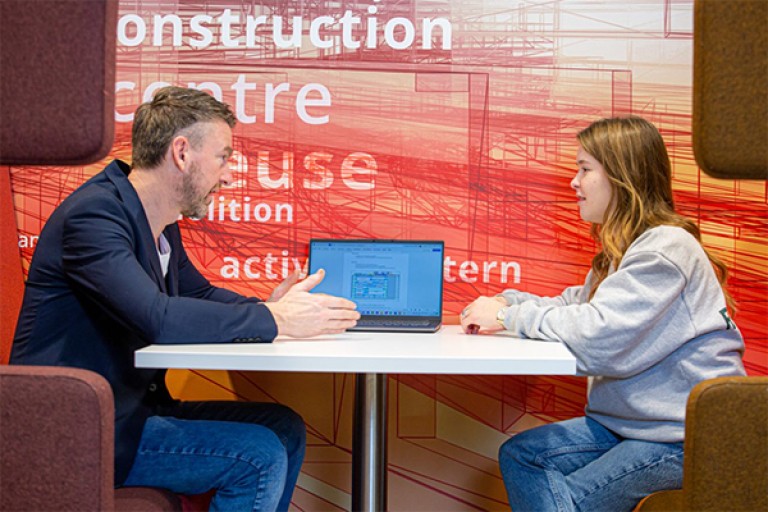
Working on social issues
You will develop your own role in projects by working on your own specific fields of interest. Just think of sociology, 3D design, Virtual Reality or self-driving cars.
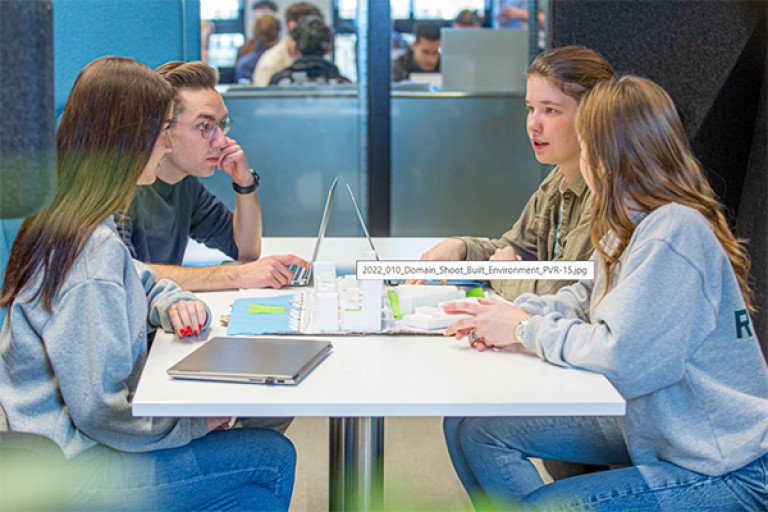
This is life!
Together with fellow students, municipalities, project developers and social organisations, you will work on real-life cases in the field of urban design and mobility.
Admission & application
- What are the admission requirements?
-
To be admitted to this degree programme, you need a higher general secondary education (havo) or pre-university education (vwo) diploma with an appropriate profile, or an equivalent of these Dutch diplomas. You can also be admitted with a secondary vocational education (mbo level-4) diploma.
- Check out the complete admission requirements and the possibilities if you do not meet the requirements
- Additional requirements have been set for the 3-year track.
- What does this study programme cost?
-
In the academic year 2026-2027 the statutory tuition fee for bachelor programmes is €2,695. In addition, you should take extra costs for software, excursions, etc. into account
- How can I apply?
-
If you meet the admission requirements, you can apply for this study programme. If you do so before 1 May, you can certainly start your studies.
What others say about Built Environment

I can see the potential of an area more clearly
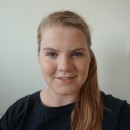
Integral thinking is key
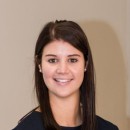
You need to understand people and their context
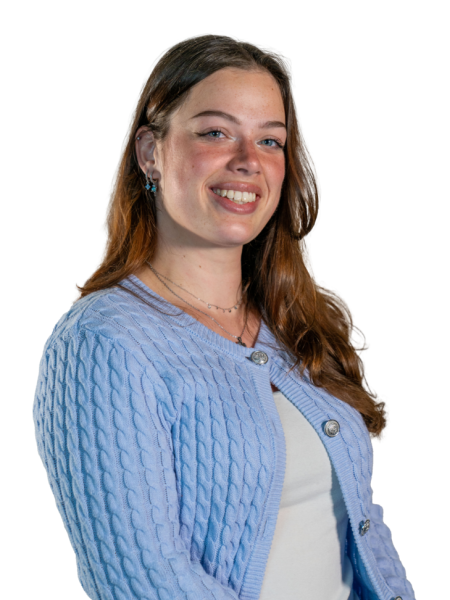
Your future starts here
- The job market needs you
Explore your career options - Choose your path
Discover your potential - Learn from the best
Graduates share their experiences
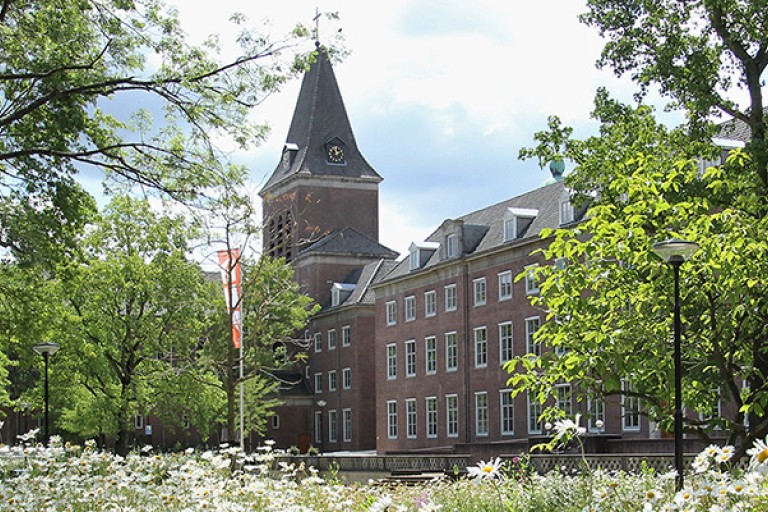
Virtual campus tour
Have a virtual look and discover our campus, the building where you’ll be studying and what more the campus has to offer.
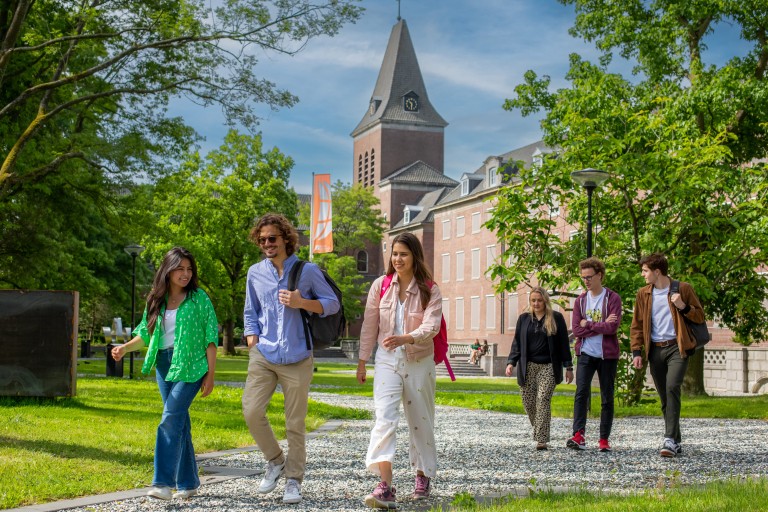
Studying at BUas
What is it like studying at BUas? What does the campus look like and what activities can be undertaken? Is Breda actually a vibrant university town?
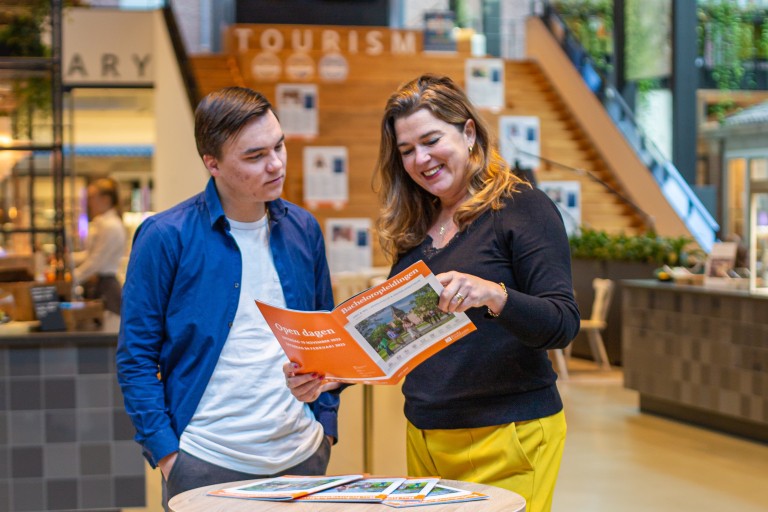
Assistance in choosing your study programme
Do you already know exactly what you want to study or do you not have any clue at all? Find out, compare and choose your professional/ academic bachelor’s or master’s programme at BUas.

